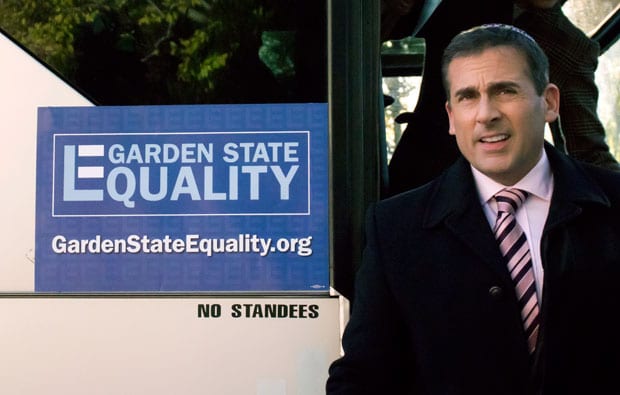
Two women — one closeted, older detective Laurel (Julianne Moore), the other out-and-proud young gearhead Stacie (Ellen Page) meet at, of course, a women’s volleyball tourney. They date, tentatively, because, of course, Laurel is afraid of being outed even though she appears to be the top police officer on the force. They fall in love, move in together and get a domestic partnership before Laurel tells her partner, Dane (Michael Shannon), that she’s gay and, of course, he reacts with the macho “we’re-partners-you-can’t-hide-things-from-me” speech. Then Laurel gets cancer and tries to assign her pension benefits to Stacie, but the county elders, called Freeholders, are, of course, disgusted that a dyke wants to ruin the sanctity of marriage. Of course, of course, of course.
Freeheld is, in the worst possible way, an “of course” movie, from the first shot to the last. Nuance? For pussies. Complexity? Puh-leez. You’re either with ’em or ag’in ’em, and if you’re ag’in, you’re a homophobe. And probably a white male. With a goombah accent. And you dress bad.
Based on a true story — the eponymous 2007 Oscar winning documentary short is breathtakingly powerful in a quarter of the time — Freeheld is certainly the most disappointing and frustrating film of the season precisely because its message is so inherently powerful, the filmmakers’ decision to continually remind you of that smacks of overkill.
This is not a surprise considering that the screenwriter, Ron Nyswaner, did virtually the same thing with Philadelphia more than 20 years ago. Philadelphia told an important story of prejudice and AIDS, and way buoyed by great performances, but remember the scene where Tom Hanks’ bosses all but spat venom just upon learning he was “diseased”? You went into the courtroom scenes never doubting that the villains were villains. If they wore black hats and twirled moustaches, they could not be more stereotypical. The exact same is true here — and the cultural landscape is far different now than in 1993. The vitriol aimed at Laurel — not just denying her a pension, but also compassion — feels cloned from the Westboro Baptist playbook. The script repeatedly chastises its audience, “Don’t think! We’ll tell you what to think! Just be outraged!” That’s lazy, and innately undramatic.
The director, Peter Sollett, plays into every lame trope of the screenplay, from the “let’s fix up the house!” montage to the treacly score to the embarrassingly juvenile filming of the public-hearing scenes. There’s no texture — it feels like community theater, from the set design to the photography.
Only the performances — from Moore, Page, Shannon, Luke McFarland and a campy, over-the-top Steve Carell, pictured, as an abrasive gay-right activist — elevate this above bad Lifetime movie. Seek out the short film instead; those people are far more real.
One and a half stars.
This article appeared in the Dallas Voice print edition October 9, 2015.

